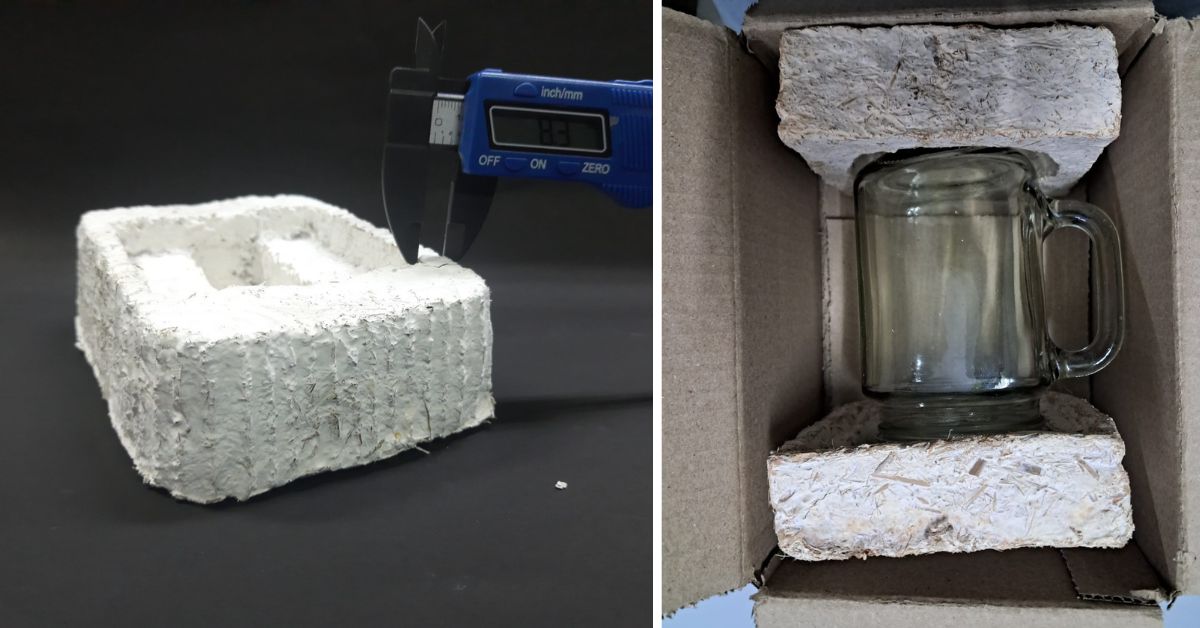[ad_1]
One facet during which most Indian households excel is the artwork of stockpiling gadgets for future use. Our storerooms typically home peculiar gadgets like previous cardboard packing containers and plentiful thermocol sheets.
Whether or not it’s for events, college initiatives, or packaging wants, thermocol ceaselessly assumes the function of a vital visitor. Its robustness, widespread availability, and light-weight nature make it appropriate for varied functions, contributing to its reputation.
Nevertheless, amidst its seemingly versatile functions, we are likely to overlook its environmental impression. Whereas a lot consideration is given to the detrimental results of plastic on the planet, there’s a less-discussed perpetrator — polystyrene. As thermocol consists of polystyrene, it turns into non-biodegradable and, when uncovered to daylight, produces dangerous air pollution.
The thermocol utilised in households and the expansive packaging business typically finally ends up filling landfills, finally discovering its strategy to the ocean. Analysis signifies that burning thermocol, a follow prevalent in lots of households, releases not solely Carbon Monoxide but in addition Styrene and a wide range of different poisonous chemical compounds, resulting in a myriad of eye and lung infections.
Regardless of quite a few research highlighting the adversarial results of thermocol, its widespread utilization continues to escalate. This raises a pivotal query: is there a relatively efficient different for the packaging business?
A 29-year-old engineer Chaitanya Dubey from Kanpur, Uttar Pradesh, could maintain the answer to this difficulty. This younger entrepreneur has efficiently created a biodegradable different to conventional thermocol utilizing mushroom mycelium and agricultural waste.
“As soon as its supposed goal is fulfilled, simply crush it and combine it into your vegetation — it’s going to function a pure fertiliser for them,” he explains to The Higher India.
Chaitanya’s journey started virtually 4 years in the past when he had simply graduated from school and was exploring new concepts to pursue. Let’s check out how this biodegradable resolution got here to be.
Bringing a sustainable different
Born and raised in Kanpur, Chaitanya grew up in a business-oriented household. “Whereas my father was a businessman, I by no means actually thought I might be one. Like most households, my dad and mom wished me to pursue engineering and safe a job,” he displays.

The predetermined path appeared cheap, and Chaitanya pursued his engineering diploma in Bengaluru. “After finishing engineering, the following step is usually to work or pursue an MBA. That was my plan too. I began working at an organization in Bengaluru whereas considering the concept of getting an MBA,” he shares.
Nevertheless, his plans took an surprising flip when he enrolled in a small enterprise course in Solan. “It was a short course that, in some ways, altered my trajectory and led me to the place I’m at present. The course opened up varied profession prospects for me, and I might envision myself as an entrepreneur. It was throughout this course that I used to be launched to mushroom farming and its potential for producing vital income,” he explains.
Mushroom farming marked the preliminary step that finally led Chaitanya to his modern breakthrough. “I initiated a small enterprise the place I cultivated each medicinal and industrial mushrooms. Whereas it was progressing properly, I aspired to do extra,” he recollects.
This need prompted Chaitanya to delve into researching the varied makes use of of various elements of mushrooms. Throughout this exploration, he found the rising idea of making leather-based from mushrooms.
“Though it was primarily a circulating idea on the time, it steered me in the direction of questioning what else may very well be crafted utilizing mushrooms,” he displays.
To additional his analysis, he additionally reached out to IIT-Kanpur. “It was a gradual transition and we nonetheless develop and promote mushrooms. It was after months of analysis and improvement that I used to be capable of make it,” he says.

In 2019, he integrated his firm underneath the identify Kinoko Biotech — an agri-tech firm that makes biomaterials out of mushrooms.
Sturdy, light-weight and planet-friendly
The thermocol is light-weight, sturdy and has the identical really feel because the polystyrene. “By way of energy, it compares favourably to high-density thermocol; nevertheless, weight-wise, it leans a bit on the heavier facet,” he informs.
Discussing the weather used to create the eco-friendly different, he explains, “Mycelium, or the roots of the mushroom, serves as a pure adhesive. Moreover, we utilise a mixture of agricultural waste and pure fibres, contributing to the sturdiness and longevity of the thermocol. The inherent properties of mushrooms make for a sturdy materials.”
He continues, “Since these are technically made out of roots of the mushroom, they develop into a byproduct of mushroom and a subcategory. Fabricated from pure supplies, the thermocol begins to decompose in about 60 to 90 days. Apart from throwing it away, one can really use it as a nourisher and pure fertiliser for vegetation.”
The thermocol takes about 5 to seven days to be made. “With regards to thermocol, there exists a variety of types. Our product falls on the marginally greater price spectrum in comparison with low-density thermocol however stays extra reasonably priced than high-density thermocol,” he says.
“To place it into perspective, our pricing falls within the mid-range, round Rs 20 to Rs 25 for 100g of packaging. As compared, low-density thermocol sometimes ranges from Rs 15 to Rs 20, whereas high-density thermocol can range extensively, reaching anyplace from Rs 30 to Rs 100 or extra,” he says.
The product is presently accessible for packaging companies, however Chaitanya has formidable plans to develop manufacturing and make it accessible for most people as properly.
“We’re additionally within the technique of creating a fabric utilizing mushrooms to create idols. Many alternate options to POP (Plaster of Paris) are dangerous to the surroundings. At present, our plant capability permits for the manufacturing of 200 items of thermocol a day, however as a part of our future plans, we goal to extend this to 1,000 items per day,” he explains.
Being a newcomer available in the market, Chaitanya is navigating the intricacies of provide chain administration and persuading companies to make this eco-friendly swap.
“Whereas most individuals have some consciousness of the environmental impression of polystyrene thermocol, there aren’t many substitutes accessible available in the market. With my inexperienced innovation, I hope to offer them with an alternate and a possibility to contribute positively to the surroundings,” he expresses.
(Edited by Padmashree Pande)
[ad_2]